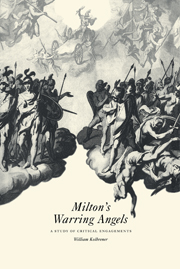Conclusion: devils, angels, and Milton
Published online by Cambridge University Press: 23 November 2009
Summary
To attend to the role of irreconcilable oppositions in Milton criticism – institutionalized in “angelic” and “satanic” camps of critics – is to acknowledge that Milton appears as one of the figures in literary history who, as Marcus and Taylor suggest, “invite and even attract dichotomous, polarized readings.” One answer to their question, “How and under what conditions do figures of cultural significance acquire dichotomous images?”, lies, as this study suggests, in the realm of historiography. Indeed, the competing and opposed claims made for Milton in the history of his reception – delineated in political, theological, and poetic arguments – have their origin in specifically Enlightenment oppositions. These oppositions are constituted, on the one side, by the “satanic” fetishism of difference, individuality and matter, and, on the other, by the “angelic” fetishism of unity, authority, and spirit. Milton's resistance to those oppositions – which are themselves hypostatized in the still on-going debates between satanic and angelic camps of critics – comes through most clearly in Paradise Lost where representation, as in the “brotherly dissimilitudes” of Areopagitica, is presupposed upon the acknowledgment of both difference and unity, on the assumption that representations will be both like and unlike their posited object.
If “Fancy,” as described by Adam in Book v of Paradise Lost, “forms Imaginations, Aery shapes,” then “Reason” “frames / All what we affirm or what deny” by “joining or disjoining” (v 105–6). Fancy asserts resemblances; reason, by both “joining” and “disjoining,” preserves difference. Milton's critics often posit “difference” or “unity” as ends in themselves, where for Milton the two exist in productive tension.
- Type
- Chapter
- Information
- Milton's Warring AngelsA Study of Critical Engagements, pp. 158 - 163Publisher: Cambridge University PressPrint publication year: 1997



